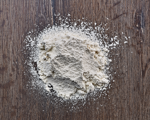
Eggs are a well-known source of protein, which helps maintain muscle mass and bones in our bodies. In this article, we dive into the protein content and distribution in eggs.
The total protein content in an egg depends on its size. Obviously, a bigger one contains more protein than a small one, but the relative content is the same. In general, eggs contain 12.3 grams of protein per 100 grams, equalling 36.7 % of the total energy value.
In many regions, the commonly used size of eggs is 'large'. Large eggs are often considered the standard or default size for many recipes unless otherwise specified. They typically weigh between 50-55 grams, and there are usually 6.2-6.8 grams of protein in an egg of this size. Medium ones weighing around 45 grams contain 5.5 grams, and a small one weighing about 40 grams contains about 4.9 grams.
The protein is not evenly distributed throughout. On average, the egg whites account for around 60-65 %, while the yolks contribute the remaining 35-40 %.
Perhaps you are also interested in reading about the protein content of avocados and how much protein is in a banana.
Protein in egg whites
The protein is mainly found in the whites, which is the clear, viscous liquid surrounding the yellow yolk. Egg white contains 10.2 grams of protein per 100 grams, contributing 92.7 % of the total energy value.
The protein in egg whites contributes to their unique properties in cooking. Whipping them can create foam often used in recipes like meringues and soufflés. The proteins in egg whites also have binding properties, allowing them to act as a binder in dishes like meatloaf or vegetable burger patties.
Protein in egg yolks
Egg yolk contains 15.6 grams of protein per 100 grams, and protein makes up about 19.8 % of the total energy value.
In cooking, the yolks contribute to richness, flavour, and texture. They are often used in baking to provide moisture, enhance emulsification, and contribute to the colour and richness of the final product. In custards, sauces, and dressings, the yolks act as a thickening and stabilising agent.

Protein content of boiled eggs
The protein content in hard-boiled eggs is the same as in uncooked ones, meaning about 6.2-6.8 grams in a standard egg of 50-55 grams, corresponding to 12.3 grams of protein per 100 grams. It is also worth noting that the boiled egg protein is just as high quality as the kind found in uncooked eggs. Eggs contain so-called complete protein and cooking them neither changes the quality nor the quantity of it.
Eggs can be prepared in numerous ways. The protein in egg whites and yolks consists of complex molecules that can denature, that is, unfold and form new structures, when exposed to heat. This denaturing process is what transforms liquid, raw eggs into boiled, fried, or poached ones with differing levels of firmness. While some cooking methods can affect the texture and flavour, the protein content remains unchanged no matter how you decide to cook it.
You might also be interested in our articles about protein in chicken and protein in skyr.
Related Articles
Looking to learn about protein content in different foods? Explore our comprehensive guides:










































